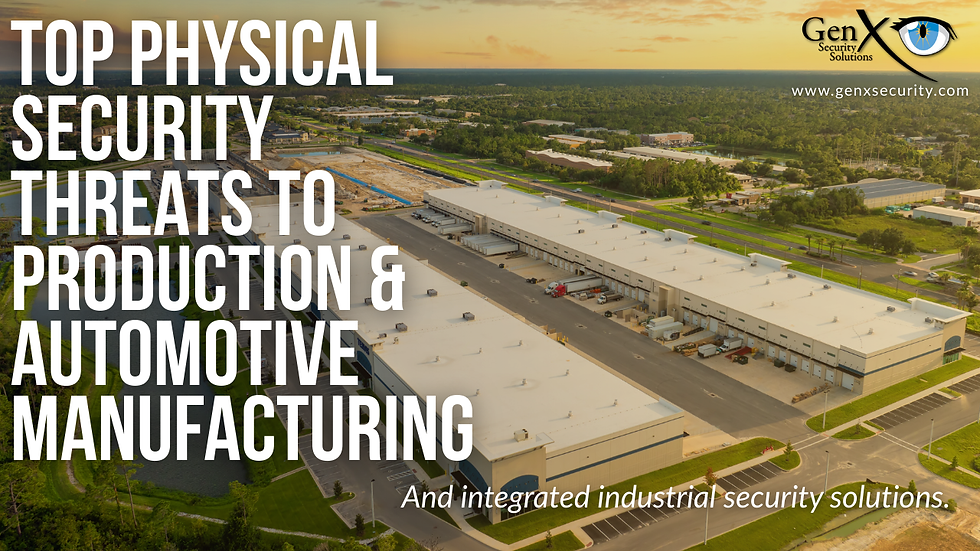Evaluating the ROI of Access Control Systems for Businesses
- GenX Security
- Dec 7, 2023
- 3 min read

It's easy to get caught up in the up-front cost of an access control system, but understanding the multi-faceted aspects of your return on access control investment can paint a much clearer, and bigger, picture that is certainly worth evaluating. In this blog post we'll discuss how to view your access control expense as an investment in your business with bigger returns!
In the ever-evolving landscape of business security, access control systems have become indispensable tools for safeguarding physical and digital assets. Beyond their primary function of regulating entry and exit, these systems can offer a range of benefits that directly impact a company's bottom line. Let's dive in.
The Foundation: Initial Investment
Before diving into the many aspects of ROI, let's address the foundational element—the initial investment. This includes the cost of hardware, software, installation, integration, and any recurring fees. While this might seem like a substantial upfront expense, businesses need to recognize that access control systems are an investment in long-term security and operational efficiency.
Tangible Cost Savings
One of the most direct and measurable benefits of access control systems is the potential for tangible cost savings. By automating and streamlining processes related to physical security, businesses can reduce the need for manual monitoring, key management, and traditional security measures. This translates into decreased labor costs and, in some cases, a reduction in insurance premiums due to enhanced security measures.
Moreover, businesses can realize savings through the prevention of unauthorized access or internal theft. Access control systems act as deterrents, discouraging malicious intent and significantly mitigating the risk of unauthorized personnel entering sensitive areas.
Risk Mitigation and Reputation Protection
Access control systems play a pivotal role in risk management. They contribute to the prevention of security breaches, unauthorized access, and potential data breaches. The cost of recovering from a security incident, both in financial and reputational terms, can far outweigh the initial investment in a robust access control system.
The protection of sensitive information and assets not only safeguards the business's financial standing but also preserves its reputation. In an era where data breaches and security lapses can irreversibly damage a company's image, the intangible benefits of maintaining a secure environment are immeasurable.
Increased Operational Efficiency
Access control systems go beyond security—they enhance operational efficiency. With features like integration with time and attendance systems, businesses can automate attendance tracking and streamline payroll processes. This not only reduces administrative overhead but also ensures accuracy in workforce management.
Additionally, modern access control systems offer remote monitoring capabilities, allowing businesses to manage and monitor access from anywhere. This newfound flexibility contributes to operational efficiency by facilitating agile responses to evolving security situations and providing real-time insights into employee movements.
Future-Proofing Investments
As technology advances, access control systems evolve to meet new challenges and incorporate innovative features. Businesses that invest in adaptable and scalable solutions position themselves to easily integrate future upgrades and technologies. This forward-thinking approach ensures that the initial investment continues to yield returns as the business environment changes.
Measuring ROI Effectively
To effectively measure the ROI of access control systems, businesses should adopt a comprehensive approach. This includes tracking metrics such as:
1. Incident Reduction: Measure the decrease in security incidents and breaches after implementing the access control system.
2. Labor Cost Savings: Quantify the time and resources saved through automated security processes and reduced manual monitoring.
3. Operational Efficiency: Evaluate the impact on day-to-day operations, considering factors like streamlined workflows and enhanced workforce management.
4. Risk Mitigation: Assess the reduction in financial and reputational risk resulting from enhanced security measures.
5. Adaptability and Future-Proofing: Consider the system's ability to evolve with technological advancements, ensuring long-term relevance.
Evaluating the ROI of access control systems requires a holistic approach that goes beyond the initial investment. By considering factors such as tangible cost savings, risk mitigation, operational efficiency, and adaptability to future changes, businesses can make informed decisions about the value these systems bring to their overall security strategy. As technology continues to play a pivotal role in business operations, access control systems stand as a crucial investment for companies looking to secure their assets, optimize processes, and future-proof their security infrastructure.
GenX Security is a licensed low voltage integrator specializing in commercial security, access control, structured cabling, fire alarms, and more. Contact us for any and all of your access control needs!
Experience the next generation of interactive security services and solutions with GenX Security.

With custom security integration solutions come custom quotes designed for your needs. Please contact us by clicking here or calling 866-598-4369.








![2020 Roaring Twenties Winner Badge[44136].jpg](https://static.wixstatic.com/media/c44162_312513fcb3514e3ca71a2a18b458369a~mv2.jpg/v1/fill/w_129,h_52,al_c,q_80,usm_0.66_1.00_0.01,enc_avif,quality_auto/2020%20Roaring%20Twenties%20Winner%20Badge%5B44136%5D.jpg)





























Comments